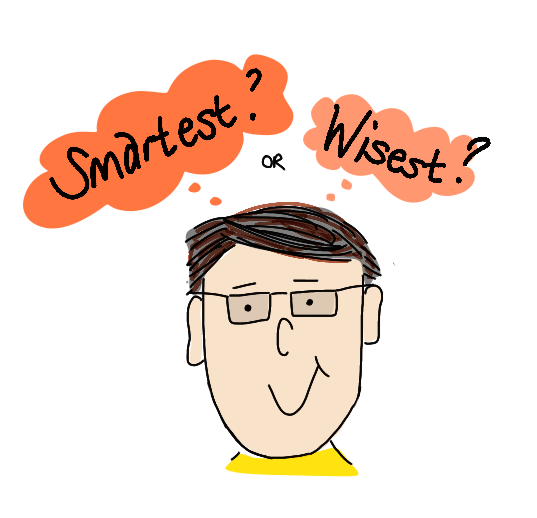Do you want to be the smartest person in the room or the wisest?
Reflections from Paul…
A few years ago I facilitated a branch workshop in a large organisation. It was arranged for the recently appointed Division head to address the early part of the workshop. It wasn’t a large group – only about 15 people – and relatively informal – no powerpoint slide presentations etc. In the first few minutes he came across as professional, highly articulate, very strategic and quite personable. He proceeded to provide his vision for where the branch needed to head and a number of ideas about what changes were required to improve the branches efficiency and effectiveness. Upon opening it up to questions he took the opportunity to further explain his ideas through providing examples of these types of changes from other organisations, reeling off some financial data and statistics to support his position while seemlessly weaving in anecdotes and references to high profile individuals and organisations.
Then he left.
I could sense an uneasiness in the room. We debriefed a little. There wasn’t a great willingness to be critical of the division head, especially with their own manager in the room. However there was clearly a view that he didn’t have a good understanding of the business, some of its unique features and nuances that may have made some of his ideas unworkable. It may have looked like resistance to change, but my feeling was that it was more a sense of not being respected, of not being heard.

There is no doubt that you were left with the impression that he was extremely intelligent and smart individual. But what impact did he have and what insights did he gain from the interaction? Well, the impact was most likely a mildly diminished trust with the group. In terms of what new insights did he gain…not much, I’d suggest. He never asked them a question; never sought to understand their perspectives or views; never engaged them in a conversation. An opportunity lost whilst building distrust. Being smart isn’t on the same continuum as being wise.
But we are not all saints here – it is an easy trap to fall into. I recall myself making the same mistake about 25 years ago. I was three days into a new job as a quality systems facilitator at a new organisation when my boss introduced me to the partner from the accounting firm that had recently undertaken a comprehensive internal audit. The exchange was relatively brief – in 10 minutes I’d managed to tell her a bit about my background and experience, some of the challenges I foresaw in the role and the first things I would be focusing on. For the first few moments after the conversation I felt pretty good about myself – I thought I’d impressed her with my dazzling intelligence! But then I started reflecting – I missed an incredible opportunity to learn something that would help me in my role. Given the nature of the work she had done and what my role was she would have provided some fantastic insights into how the organisation worked and the opportunities for improvement. But what did I take away – a bit fat nothing! I was very angry at myself at this point. However I guess the most important thing I did was recognise it. I vowed then and there to look for opportunities for learning – in fact asking questions, being curious and engaging with people was going to be more impressive that blathering on solely about my own views.
There is a huge difference – both in terms of impact and in generation of insight and new understanding – depending on whether you approach the world as a knower or a learner.
Do you approach things as someone who knows a lot of stuff and is prepared to share it with the world or are you curious about the world, recognise that there are always opportunities for learning and that insight emerges from interaction with others? The impact can be profound. My working definition of wisdom – wisdom is the quest for profound ignorance – a deep knowing of my unknowing. It may sound philosophically deep but it is practical in its impact.
So ask yourself the question: As a leader are you a knower or a learner? Are you a teller or a questioner? Are you a talker or a listener? Are you smart or wise? Observe yourself for the next 48 hours and see what you discover.
